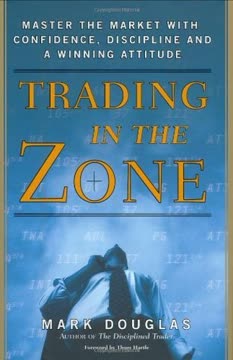Key Takeaways
1. Recognize and resolve mental game issues to gain a competitive edge
With poker more competitive than ever, more players are turning to the mental game as a valuable way to create an edge.
The mental game is crucial. As poker has evolved rapidly in the last decade, the importance of mental game skills has increased dramatically. Players who can effectively manage their emotions, maintain focus, and make rational decisions under pressure have a significant advantage over their opponents.
Common mental game issues include:
- Tilt (anger-driven poor play)
- Fear and anxiety
- Lack of motivation
- Confidence problems
Resolving these issues involves:
- Recognizing patterns in your mental game
- Implementing strategies to manage emotions in real-time
- Working on underlying causes away from the table
- Continuously evaluating and adjusting your approach
By addressing mental game weaknesses, players can unlock their full potential and gain a competitive edge in an increasingly challenging poker landscape.
2. Understand the Adult Learning Model to improve poker skills effectively
The Adult Learning Model (ALM) is a straightforward theory that defines the four distinct levels of the learning process.
The Adult Learning Model provides a framework for understanding how poker skills are developed and mastered. By recognizing the different stages of learning, players can more effectively approach skill improvement and identify areas for growth.
The four levels of the Adult Learning Model are:
- Unconscious Incompetence: You don't know what you don't know
- Conscious Incompetence: You become aware of your weaknesses
- Conscious Competence: You can perform skills with focus and effort
- Unconscious Competence: Skills become automatic and effortless
Understanding this model helps players:
- Identify which skills are truly mastered (Unconscious Competence)
- Recognize areas that require more practice and focus
- Set realistic expectations for skill development
- Approach learning new concepts with patience and persistence
By applying the ALM to poker skill development, players can create a more structured and effective approach to improving their game.
3. Harness emotion as a tool for improvement rather than a hindrance
Emotion is not the problem. It's the key to mastering your game.
Emotions are valuable signals. Rather than trying to eliminate or suppress emotions, successful poker players learn to use them as indicators of areas that need improvement. Emotions can highlight flaws in your mental approach to the game and provide valuable insights for growth.
Key points about emotion in poker:
- Emotions accumulate over time and can impact future sessions
- There is a spectrum of emotional intensity for each type (e.g., frustration to rage)
- Optimal performance occurs within a specific range of emotional arousal
To harness emotion effectively:
- Develop awareness of your emotional patterns
- Identify the underlying causes of strong emotions
- Use emotions as motivation to address weaknesses
- Practice emotional regulation techniques
- Gradually expand your ability to perform well under emotional pressure
By reframing emotions as tools for improvement rather than obstacles, players can transform their mental game and achieve more consistent, high-level performance.
4. Implement a strategic approach to address tilt and other mental game problems
Injecting logic is the muscle you bring to this fight to delay, reduce, or block out tilt (or other problems) while you're playing.
A systematic approach is key. Addressing mental game issues requires a well-defined strategy that combines in-the-moment techniques with long-term solutions. The "Injecting Logic" method provides a framework for managing emotional challenges during play.
Steps for implementing the Injecting Logic strategy:
- Recognition: Identify early signs of tilt or other issues
- Deep Breath: Create mental separation from emotions
- Inject Logic: Use prepared statements to counter emotional reactions
- Strategic Reminder: Review key poker concepts to refocus
- Repeat as Necessary: Continue the process throughout the session
- Quit: Know when to end the session if issues persist
Long-term resolution involves:
- Analyzing patterns in your mental game
- Identifying underlying causes of emotional reactions
- Developing and practicing coping strategies
- Regularly evaluating progress and adjusting your approach
By combining in-the-moment techniques with ongoing work away from the table, players can systematically improve their mental game and reduce the impact of tilt and other issues on their performance.
5. Identify and overcome various types of fear in poker
Fear is an accumulation of anxiety. Anxiety is an accumulation of doubt or uncertainty.
Fear stems from uncertainty. Understanding the root causes of fear in poker can help players develop effective strategies for overcoming it. By breaking down fear into its components, players can address specific areas of uncertainty and build confidence.
Common types of fear in poker:
- Fear of failure
- Fear of success
- Fear of making mistakes
- Fear of moving up in stakes
- Fear of bad runs
To overcome fear:
- Identify specific questions or uncertainties causing anxiety
- Develop skills to better recognize variance, your skill, and opponents' skill
- Set realistic goals and expectations
- Practice visualization and positive self-talk
- Gradually expose yourself to fear-inducing situations
- Learn from setbacks and view them as opportunities for growth
By systematically addressing the underlying causes of fear and building relevant skills, players can develop a more resilient mindset and perform more consistently under pressure.
6. Cultivate stable motivation to maintain consistent performance
Motivation is the emotion or energy behind achieving your goals. It's the fuel used to accomplish them.
Stable motivation is essential. Maintaining consistent motivation is crucial for long-term success in poker. By understanding the nature of motivation and addressing common issues, players can develop a more stable and sustainable approach to the game.
Key aspects of motivation in poker:
- Goal setting and alignment
- Sources of energy and drive
- Balance between short-term inspiration and long-term motivation
Common motivational problems and solutions:
- Laziness: Develop structured routines and habits
- Procrastination: Break tasks into smaller, manageable steps
- Burnout: Implement regular breaks and self-care practices
- Goal-related issues: Set clear, achievable, and meaningful goals
To cultivate stable motivation:
- Identify personal sources of motivation beyond short-term results
- Develop a balanced approach to goal-setting
- Create a supportive environment and network
- Regularly reassess and adjust goals and strategies
- Celebrate small victories and progress along the way
By focusing on developing stable motivation, players can maintain consistent effort and performance, even during challenging periods or downswings.
7. Develop stable confidence independent of short-term results
Having stable confidence means that your confidence never swings to extremes because of variance.
Confidence should be skill-based. Developing stable confidence that is not overly influenced by short-term results is crucial for consistent performance in poker. This involves building a strong foundation of skills and addressing underlying mental game flaws.
Key components of stable confidence:
- Skill of recognizing variance
- Skill of recognizing your own skill
- Skill of recognizing opponents' skill
Common illusions that undermine confidence:
- Illusion of control
- Illusion of permanence
- Illusion of learning
To develop stable confidence:
- Improve your ability to accurately assess variance, your skill, and opponents' skill
- Address underlying mental game flaws that create false confidence
- Set realistic expectations based on skill rather than short-term results
- Regularly evaluate and update your assessment of your abilities
- Focus on process-oriented goals rather than solely outcome-based goals
By building stable confidence based on accurate self-assessment and skill development, players can maintain a more consistent mental state and perform at a higher level, regardless of short-term variance.
Last updated:
FAQ
What's "The Mental Game of Poker" about?
- Focus on Mental Game: "The Mental Game of Poker" by Jared Tendler focuses on the psychological aspects of poker, providing strategies to improve mental resilience and performance.
- Proven Strategies: The book offers proven strategies for improving tilt control, confidence, motivation, and coping with variance.
- Scientific Approach: Tendler uses a fact-based, scientific approach backed by modern psychology to address common mental game issues.
- Comprehensive Guide: It serves as a comprehensive guide for poker players looking to enhance their mental game and achieve better results.
Why should I read "The Mental Game of Poker"?
- Improve Performance: The book provides tools to help players consistently bring their A-game and improve overall performance.
- Handle Variance: It offers strategies to cope with the inherent variance in poker, reducing the emotional impact of bad runs.
- Resolve Tilt Issues: Readers can learn to manage and eventually resolve tilt, a common issue that affects decision-making.
- Enhance Confidence: The book helps players develop stable confidence, preventing the emotional rollercoaster tied to short-term results.
What are the key takeaways of "The Mental Game of Poker"?
- Tilt Control: Understanding and managing tilt is crucial for maintaining a high level of play.
- Emotional Awareness: Recognizing and addressing emotions like fear and overconfidence can improve decision-making.
- Learning Process: The book emphasizes the importance of understanding the learning process to improve both technical and mental skills.
- Stable Confidence: Developing stable confidence is essential for consistent performance, regardless of short-term results.
How does Jared Tendler define "tilt" in "The Mental Game of Poker"?
- Anger and Bad Play: Tilt is defined as playing badly due to anger, not just any poor play.
- Symptom, Not Cause: Anger is a symptom of underlying issues, not the root cause of tilt.
- Resolution Strategy: The book provides strategies to manage tilt in the short term and resolve it in the long term.
- Types of Tilt: Tendler identifies several types of tilt, including injustice tilt, hate-losing tilt, and revenge tilt.
What is the "Adult Learning Model" in "The Mental Game of Poker"?
- Four Levels of Learning: The Adult Learning Model (ALM) describes four levels: Unconscious Incompetence, Conscious Incompetence, Conscious Competence, and Unconscious Competence.
- Learning Process: It outlines the predictable process of learning a skill, from not knowing what you don't know to mastering it.
- Application to Poker: Understanding the ALM helps players identify where their skills are in the learning process.
- Improvement Strategy: The model is used to develop a structured approach to improving both technical and mental game skills.
How does "The Mental Game of Poker" address fear and anxiety?
- Spectrum of Emotion: Fear is described as an accumulation of anxiety, which starts as doubt or uncertainty.
- Underlying Questions: Fear often stems from unanswered questions or unproven beliefs about one's game.
- Resolution Techniques: The book provides strategies to identify and answer these underlying questions to reduce fear.
- Performance Under Pressure: It emphasizes using fear as fuel to perform at a high level, rather than letting it hinder performance.
What is "Injecting Logic" in "The Mental Game of Poker"?
- Short-term Strategy: Injecting logic is a short-term strategy to manage mental game problems while playing.
- Thinking Through Issues: It involves talking yourself through issues with logical statements to delay or reduce emotional reactions.
- Bridge to Resolution: This strategy acts as a bridge to long-term resolution by helping players remain in control during emotional moments.
- Steps to Implement: The book outlines steps to recognize emotional patterns, take deep breaths, and inject logic to maintain focus.
How does "The Mental Game of Poker" help with motivation issues?
- Identify Root Causes: The book helps identify underlying causes of motivational problems, such as goal issues or other mental game leaks.
- Stable Motivation: It emphasizes finding a balance between motivation and inspiration for consistent performance.
- Goal Setting: Proper goal setting is crucial for maintaining motivation, with a focus on both process-oriented and results-oriented goals.
- Addressing Laziness: Laziness is treated as a learned skill that can be unlearned with the right strategies and mindset.
What are the best quotes from "The Mental Game of Poker" and what do they mean?
- "Tilt? Jared Tendler extends his arm and casually flicks a middle finger at it." - This quote highlights Tendler's confidence in addressing tilt issues with effective strategies.
- "Jared invented the field as far as I’m concerned." - This emphasizes Tendler's pioneering role in developing the mental game of poker.
- "He teaches you things you simply can’t learn by playing." - This underscores the importance of mental game coaching beyond just playing experience.
- "The mental game is deep, complicated, and mysterious." - This quote reflects the complexity of the mental game and the need for a structured approach to mastering it.
How does "The Mental Game of Poker" suggest handling variance?
- Understanding Variance: The book emphasizes the importance of understanding variance as a skill to improve decision-making.
- Emotional Control: It provides strategies to manage emotions during bad runs, preventing them from affecting performance.
- Long-term Perspective: Players are encouraged to focus on long-term results rather than short-term fluctuations.
- Variance as Opportunity: Variance is seen as an opportunity to identify and address weaknesses in both technical and mental games.
What is the "Inchworm" concept in "The Mental Game of Poker"?
- Improvement Over Time: Inchworm is a concept that illustrates how improvement happens over time by addressing both strengths and weaknesses.
- Range of Performance: It describes the natural range in the quality of a player's game, from best to worst.
- Consistent Progress: The concept emphasizes the importance of consistently improving weaknesses to move the entire range forward.
- Avoiding Pitfalls: Understanding inchworm helps players avoid common pitfalls in learning and performance.
How does "The Mental Game of Poker" help develop stable confidence?
- Recognizing Variance: Developing the skill to recognize variance helps players assess their skill and results more accurately.
- Understanding Skill Levels: The book emphasizes the importance of recognizing one's own skill and the skill of opponents.
- Resolving Illusions: It addresses common illusions, such as the illusion of control, that undermine confidence.
- Building a Solid Foundation: Stable confidence is built on a solid foundation of proven skills and realistic assessments of one's game.
Review Summary
The Mental Game of Poker is highly praised for its insights into the psychological aspects of poker, focusing on tilt management, emotional control, and mental preparation. Readers appreciate its practical strategies for improving decision-making and performance under pressure. Many consider it essential reading for serious players, with some finding its principles applicable beyond poker. While primarily aimed at professionals, casual players also benefit from its teachings. Some readers note the book's repetitive nature and dry writing style but still value its content for enhancing their mental game.
Similar Books









Download PDF
Download EPUB
.epub digital book format is ideal for reading ebooks on phones, tablets, and e-readers.






